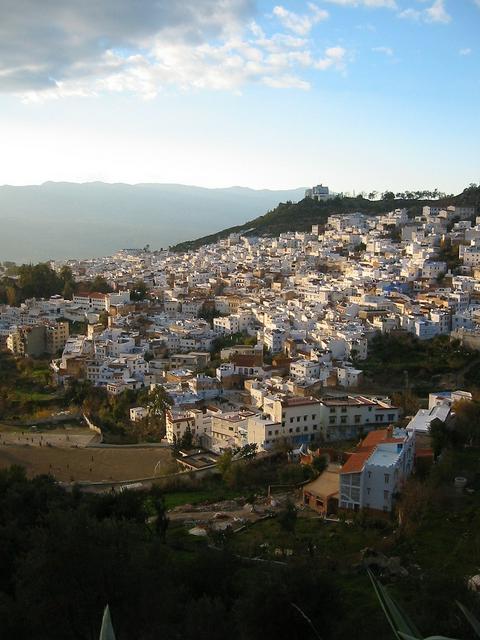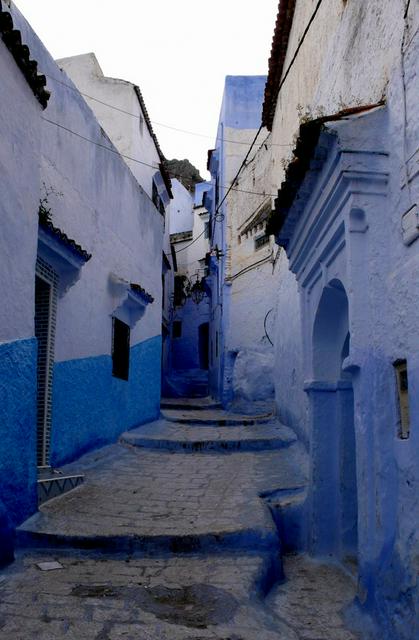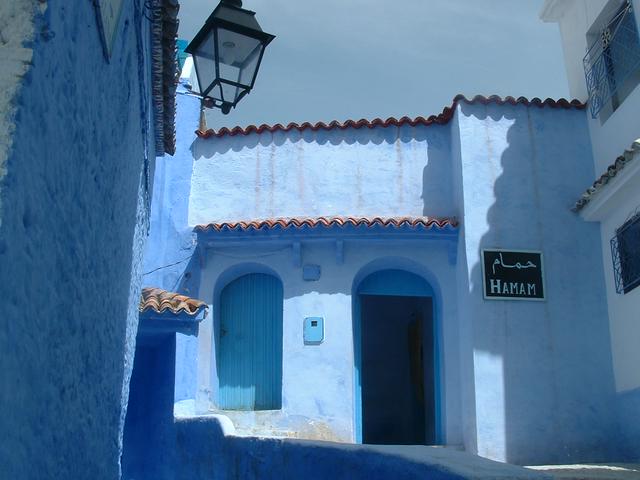
Chefchaouen (شفشاون, also Chaouen, Chawen or Xaouen) is a gorgeous mountain city in northeastern Morocco.
It's no wonder that tourists flock here — this humble town is the embodiment of almost every Moroccan cliché. The picturesque medina, set against the dramatic backdrop of the Rif Mountains, is filled with white-washed homes with distinctive, powder-blue accents, and the call to prayer rings out of several mosques around the town in chorus. If you've got a few days to relax from the rigors of travel, this is a good place to do it.
Tourism in Chaouen is also driven by its reputation as centre of the marijuana plantations region in North Morocco. Drugs are widespread and somehow tolerated, but touts trying to sell to tourists are also very annoying.
Spanish is the foreign language mostly spoken by the population, while French is the language of higher education.

- The medina is the focal point of interest for most visitors to Chefchaouen. Walking around the town with its whitewashed walls, originally decorated in this style by Jewish immigrants, can be a nice change to the hustle and bustle of the cities of Marrakech, Rabat, and Fez.
- Sorgente Ras el-Ma Waterspring. A meeting point for local residents who come to cool off, chat and do their laundry (including carpets on sunny sundays). The café nearby is rather expensive, however it's a nice change from the main square.
- Jemaa Bouzafar mosque. The ruins of an old mosque, on a hill behind the waterfall, overlook the medina and its crumbling tower offers great views of the town.
- Kasbah. Looks quite interesting from the outside, but there isn't much to see inside. The place is well preserved. There's the tower and the prison amongst others that's worth a visit, and the courtyard is green and almost alien amdist the mountain setting. Should only be an option if you're either bored or want to get away from the bustle outside. 60 dirham.
- Viewpoint above the Hotel Atlas. A good viewpoint on the town and the valley, especially on sunsets. It can be reached from the south gate of the medina (Bab el-Ain) by climbing the road coasting the medina on the west side until the east gate (Bab Souk), and then uphill, crossing the old cemetery on a rocky path.
Sorgente Ras el-Ma Waterspring. A meeting point for local residents who come to cool off, chat and do their laundry (including carpets on sunny sundays). The café nearby is rather expensive, however it's a nice change from the main square.
Jemaa Bouzafar mosque. The ruins of an old mosque, on a hill behind the waterfall, overlook the medina and its crumbling tower offers great views of the town.
Kasbah. Looks quite interesting from the outside, but there isn't much to see inside. The place is well preserved. There's the tower and the prison amongst others that's worth a visit, and the courtyard is green and almost alien amdist the mountain setting. Should only be an option if you're either bored or want to get away from the bustle outside. 60 dirham.
Viewpoint above the Hotel Atlas. A good viewpoint on the town and the valley, especially on sunsets. It can be reached from the south gate of the medina (Bab el-Ain) by climbing the road coasting the medina on the west side until the east gate (Bab Souk), and then uphill, crossing the old cemetery on a rocky path.

- Take a hike through the scenic Rif Mountains. There is a pathway leading up into the mountains just behind the waterfall frequented by backpackers. Don't mind the vast marijuana plantations; the farmers and goat herders that work them are used to tourists and will either ignore you or try to sell you hash. See "Stay safe" below.
- A strenuous hike up Jebel al-Kalaa. (the peak immediately overlooking the town) is fun, but can take up to 9 hours round trip and goes by (and if you're lucky/unlucky, through) big marijuana plantations. The route is not well marked (with white and yellow), and you might have to trail blaze for parts of it if you lose the trail. Start by following the road up the southeastern valley, from where you'll get a good view of town, and look for the markings up the mountain. Bring plenty of water, and some snacks.
- A two-day hike in the Talasemtane national park. via Asilane to Akchour also starts up the big mountain on a 4WD track which goes of in the north of Chefchaouen just after the camping site. At the peak at about 1,800 m is a camping site. There maybe snow even until April, so be prepared for cold temperatures. There are at least two water sources on the way up, so you'll not need to carry too much water. It's about 14 km until the gite in Asilane. The 4WD track continues until the next village from where one has to cross over a small valley, continue straight after passing a tomb-house and climb down the small path to the village of Inezgane. From there, a mule treck follows the river more or less closely and the gorgeous mountains, cliffs and breathtaking views. After a while the path goes down to the river over an ancient bridge and continues north, passing a source (although this one might dry up in summer) and eventually leads to the village of Akchour which has another Gite, but also cheaper accommodation. See below for getting back to Chaouen. There are more tracks and gites in the area. It is possible to even hike to Oued Laou at the Mediterranean.
- Do a 1½-hr hike in the mountains towards the The God's bridge. (Pond de Dieu). After the dam, the path lies on the right side of the river and goes up the hill quite steep. The bridge was formed by the river floating underground and carving its way over millennia. There seems also be a way down at the river, so one can see the bridge from below. Don't try this in spring though, as after snow-melt or rain the river may be unpassable. To left over the river starts a path towards the cascades.
Getting there: buses to Akchour leave Chefchaouen bus station at ~08:00, 10:00, 14:00, 17:00; 20-40 dirham. Otherwise take a grand taxi, 150 dirham per taxi. Getting back may be a bit of a hassle, as the grand taxi only runs rarely. On weekends in the afternoon, you may be able to hitch with locals who went there for a weekend trip and will the head back to Tanger. They can drop you at Dar Akouba from where it is easy to get transport back to Chefchoauen.
Take a hike through the scenic Rif Mountains. There is a pathway leading up into the mountains just behind the waterfall frequented by backpackers. Don't mind the vast marijuana plantations; the farmers and goat herders that work them are used to tourists and will either ignore you or try to sell you hash. See "Stay safe" below.
A strenuous hike up Jebel al-Kalaa. (the peak immediately overlooking the town) is fun, but can take up to 9 hours round trip and goes by (and if you're lucky/unlucky, through) big marijuana plantations. The route is not well marked (with white and yellow), and you might have to trail blaze for parts of it if you lose the trail. Start by following the road up the southeastern valley, from where you'll get a good view of town, and look for the markings up the mountain. Bring plenty of water, and some snacks.
A two-day hike in the Talasemtane national park. via Asilane to Akchour also starts up the big mountain on a 4WD track which goes of in the north of Chefchaouen just after the camping site. At the peak at about 1,800 m is a camping site. There maybe snow even until April, so be prepared for cold temperatures. There are at least two water sources on the way up, so you'll not need to carry too much water. It's about 14 km until the gite in Asilane. The 4WD track continues until the next village from where one has to cross over a small valley, continue straight after passing a tomb-house and climb down the small path to the village of Inezgane. From there, a mule treck follows the river more or less closely and the gorgeous mountains, cliffs and breathtaking views. After a while the path goes down to the river over an ancient bridge and continues north, passing a source (although this one might dry up in summer) and eventually leads to the village of Akchour which has another Gite, but also cheaper accommodation. See below for getting back to Chaouen. There are more tracks and gites in the area. It is possible to even hike to [[Oued Laou]] at the Mediterranean.
Do a 1½-hr hike in the mountains towards the The God's bridge. (Pond de Dieu). After the dam, the path lies on the right side of the river and goes up the hill quite steep. The bridge was formed by the river floating underground and carving its way over millennia. There seems also be a way down at the river, so one can see the bridge from below. Don't try this in spring though, as after snow-melt or rain the river may be unpassable. To left over the river starts a path towards the cascades.
Getting there: buses to Akchour leave Chefchaouen bus station at ~08:00, 10:00, 14:00, 17:00; 20-40 dirham. Otherwise take a grand taxi, 150 dirham per taxi. Getting back may be a bit of a hassle, as the grand taxi only runs rarely. On weekends in the afternoon, you may be able to hitch with locals who went there for a weekend trip and will the head back to Tanger. They can drop you at Dar Akouba from where it is easy to get transport back to Chefchoauen.
- Hassan's Workshop, +212 065 00717. 09:00-18:00-ish. Run by a tremendously approachable man called Hassan, it can be found towards the eastern end of the medina, between the old olive tree and the waterfall. Once you're in the vicinity, just ask for "El Taller de Hassan" and you'll be pointed in the right direction (or call ahead). He speaks fluent Spanish and good English & French, and is totally amenable to any peculiarities or requests you might have. He doesn't look for sales out of his workshop, as he makes good trade through the various local stores and a few overseas bulk buyers, but he enjoys making one-offs, which makes for wonderful craftsmanship, great prices and no hassle.
- Gite Talassemtane Tours. Can organise pottery and gastronomy workshops.
Hassan's Workshop, +212 065 00717. 09:00-18:00-ish. Run by a tremendously approachable man called Hassan, it can be found towards the eastern end of the medina, between the old olive tree and the waterfall. Once you're in the vicinity, just ask for "El Taller de Hassan" and you'll be pointed in the right direction (or call ahead). He speaks fluent Spanish and good English & French, and is totally amenable to any peculiarities or requests you might have. He doesn't look for sales out of his workshop, as he makes good trade through the various local stores and a few overseas bulk buyers, but he enjoys making one-offs, which makes for wonderful craftsmanship, great prices and no hassle.
Gite Talassemtane Tours. Can organise pottery and gastronomy workshops.
All the usuals are on offer in the medina — carpets, leatherwares, spices, metal wares, etc. If you're a seasoned bargainer you can probably get better prices in Fes or Marrakech, but Chefchaouen is undoubtedly a more pleasant place to shop. You'll also find plenty of hippie-wear aimed at budget travelers and marijuana tourists.
Chaouen is particularly renowned for leather artisans, and there are 4 or 5 workshops dotted through the town, whose goods you can find at many of the local stores and in the larger northern cities. Many of the craftsmen in Fes and Tetouan served their apprenticeships here. The choice in local stores is often limited to bags and purses, so if you're up for it take advantage of the workshops where you can tweak a standard design or come up with something entirely your own, even moving beyond traditional leather into snake, crocodile, lizard and more. They can make pretty much anything, from guitar straps and tobacco pouches, to handbags and jackets. It can take a couple of days to make the more complex designs, so head there on your first day, or have it shipped home (£6 within Europe).
The local specialty is baissara, but you'll also find the usual staples such as tajine (vegetable stew with goat or sheep), harira (tomato soup), kofte (meatballs) and tagras (fish). The Salada Marroqui is a salad of cucumber and tomatoes, while salada variada includes eggs. The region is also well known for olives and olive oil, and for goat cheese, which is sold on display in various shops.
If eating in the medina, avoid restaurants on the Kasbah square (plaza Uta el Hamman) offering tourist menus for 45 dirham (drinks not included): they will just serve you very low-quality kofte and harira, for a more than average price.
Local breakfast includes milk-coffee (café con leche) and pancakes (baghrir) with honey and olive oil or butter, for 10-15 dirham. Good places to have breakfast with the locals are the bar on plaza Hauta, in the Medina, and the bar in front of the Gendarmerie Nationale in av. Mohamed V.
- Assadaa. This little restaurant occupies both sides of the street, with tables on the road, under a tree, and on a roof terrace. Nice tajine and great cheese salad. Lunch for 50 dirham, all included.
- Chez Foad. Also do a great fish tajine, and a shrimp tajine, salad and cous-cous are also very good. Great relation quality/price.
- Granada. Great fish tajine, great couscous. Mains ~25 dirham.
- Restaurant Populaire Bab Ssour, rue Elkharrazin N°5, +212 539882165. Good food in a quiet room with a most friendly owner. Many languages spoken. Good local cheese. 50 dirham.
- For a sandwich break, head for the local sandwich dealer to the left of Bab el-Ain gate. Chicken, beef or shrimps sandwiches, with olives, salad and sauces, for 25 dirham.
Assadaa. This little restaurant occupies both sides of the street, with tables on the road, under a tree, and on a roof terrace. Nice tajine and great cheese salad. Lunch for 50 dirham, all included.
Chez Foad. Also do a great fish tajine, and a shrimp tajine, salad and cous-cous are also very good. Great relation quality/price.
Granada. Great fish tajine, great couscous. Mains ~25 dirham.
Restaurant Populaire Bab Ssour, rue Elkharrazin N°5, +212 539882165. Good food in a quiet room with a most friendly owner. Many languages spoken. Good local cheese. 50 dirham.
Alcohol is not readily available but can be found. Mint tea is prevalent (6-10 dirham the cup/pot).
As Chefchaouen is on the edge of Morocco's marijuana growing region, touts desperate to extract money from travelers can be a serious problem. They can often be quite persistent and sometimes even threatening. However, smiling, remaining calm, and politely refusing (repeatedly) will usually work without a problem.
Travelers hiking in the Rif Mountain area close to the town have had stones thrown at them by armed men to scare them away from areas of marijuana production. While most of the growers may ignore you, some may offer to sell to you as well. While many travelers partake in or even come here specifically for the abundance of marijuana (hashish), understand that it is definitely illegal and heavily punishable. The best way to avoid running afoul of any local growers is to hire a sanctioned local guide.
On arriving in Chefchaouen, you may be met by touts at the bus station. These will probably try to take you to some cheap and low-quality hostel in the medina - but it is better to find the place by yourself, because if you arrive with touts, you'll be charged extra so they can get their commission. Touts will then insist that you follow them to their house in the medina, and there try to sell you a stash of dope for 300-500 dirham. Refusing to buy is not contemplated, nor safe, if you end up in such a situation, so just say no from the beginning and don't sympathise nor accept help.
The Souika/Mauretania hostel has many touts which quite aggressively try to get people there. They will claim the hotel you’re looking for is closed or on restoration. Don't trust these at all and insist on going to your planned destination.
As for the whole of Morocco, avoid tap water for safety concerns, and drink bottled water (6 dirham for a cold 1 l bottle) or drinks (8 dirham for 0.5 l Coke).
Re-filling a number of smaller water bottles from a large one then re-selling them is a reasonably common practice, so check the seals carefully.
- Tetouan
- Tangier
- Rabat
- Casablanca
- Meknes
- Fez
- Berbered and Ketama
- Oued Laou
- Ceuta
